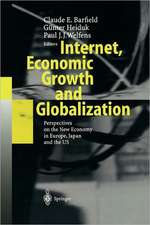Globalization and Regionalization: Challenges for Public Policy
Editat de David B. Audretsch, Charles F. Bonseren Limba Engleză Hardback – 30 noi 2001
In the second chapter of this volume, Alfred C. Aman, Jr. examines whether globalization dictates new approaches to governance. The process by which public policy in England has incorporated regional government is the focus of Kenneth Spencer in Chapter 3. In the fourth chapter Lawrence S. Davidson provides an analysis of the impact of globalization on manufacturing in the US Midwest. In Chapter 5, John W. Ryan shows how there is a dual role of universities in the global economy. On the one hand, universities serve as institutions that foster globalization and reduce the isolation of regions. On the other hand, universities themselves are shaped and influenced by globalization. David B. Audretsch and A. Roy Thurik, in Chapter 6, show how globalization has led to the emergence of the strategic management of regions. In Chapter 7, Jean-Pierre van Aubel and Frans van Nispen examine the links between federalization and globalization in the European context. The impact of globalization on regulatory institutions is the focus of Montserrat Cuchillo in Chapter 8. Finally, in Chapter 9, David Eaton examines the relationship between global trade sovereignty and sub-national autonomy.
Taken together, these chapters provide a compelling view that public policy must be considered in a new light in the global economy. Not only does policy have to consider global implications, but also the importance of local characteristics and regional strengths.
| Toate formatele și edițiile | Preț | Express |
|---|---|---|
| Paperback (1) | 632.37 lei 6-8 săpt. | |
| Springer Us – 24 oct 2012 | 632.37 lei 6-8 săpt. | |
| Hardback (1) | 638.43 lei 6-8 săpt. | |
| Springer Us – 30 noi 2001 | 638.43 lei 6-8 săpt. |
Preț: 638.43 lei
Preț vechi: 751.10 lei
-15% Nou
Puncte Express: 958
Preț estimativ în valută:
122.16€ • 127.55$ • 101.11£
122.16€ • 127.55$ • 101.11£
Carte tipărită la comandă
Livrare economică 04-18 aprilie
Preluare comenzi: 021 569.72.76
Specificații
ISBN-13: 9780792375524
ISBN-10: 0792375521
Pagini: 130
Ilustrații: V, 120 p.
Dimensiuni: 155 x 235 x 13 mm
Greutate: 0.36 kg
Ediția:2002
Editura: Springer Us
Colecția Springer
Locul publicării:New York, NY, United States
ISBN-10: 0792375521
Pagini: 130
Ilustrații: V, 120 p.
Dimensiuni: 155 x 235 x 13 mm
Greutate: 0.36 kg
Ediția:2002
Editura: Springer Us
Colecția Springer
Locul publicării:New York, NY, United States
Public țintă
ResearchCuprins
1 Globalization and Regionalization: Introduction.- 2 Globalization, Democracy, and New Approaches to Governance in the United States.- 3 Reaching Out to Regional Government in England?.- 4 Globalization and Changes in Industrial Concentration: State and Regional Exports from America's Heartland, 1988-1997.- 5 Globalization and the Local University.- 6 Globalization and the Strategic Management of Regions.- 7 Living Apart Together in Europe.- 8 The Changing Nature of Regulation: Some Observations from a Southern European Perspective.- 9 Global Trade Sovereignty and Subnational Autonomy.





















